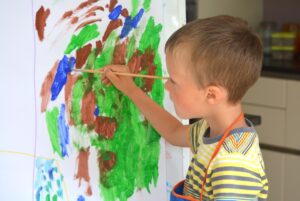
We were created to create.
In my insomnia addled brain, this concept makes total sense to me. I see little ones creating the moment they can hold a crayon in their chubby, toddler hands. Children tell stories as soon as they can string words together, their pretend worlds as real as reality, their sentences punctuated with wide-eyed sincerity. Whatever part of our brain is responsible for imaginative musings is fully alive in children, electric with vitality and stretchy possibilities.
At some point many of us lose that connection, drilled out of us by multiplication facts, the laws of grammar and the needs of a capitalistic society—we all want to eat and put a roof over our heads, after all.
Historically, communities have nurtured and nourished the artist in their midst—one wonders if cave painters were given their due. In many indigenous cultures, the word art does not exist, as beautiful things were integrated into everyday life through the exquisite craft of practical items. During 14th century Europe, artists were seen more as craftsmen and wandering musicians were given food and exposure on feudal estates. During the Renaissance, where the rich and titled fought for the privilege of having an artist in residence. Then of course, the printing press changed everything and the rise of media created celebrity artists. Campbells soup cans, anyone?

The above is a fast and incomplete take on the history of how creators were treated throughout history and I am totally cognizant of the fact that the stereotype of the starving artist was grounded in reality. But my point remains, we were born to create.
Unfortunately, we are also now conditioned to consume. That should actually be a T-shirt. Born to create, conditioned to consume. If we are all busy scrolling, distracted by adverts, funny videos and the hustle needed to buy all the things we need, as well as the stuff we are told we need, then we have little time to create. Soon, with the rise of Artificial Intelligence, we won’t need to create—it’ll be done for us. What happens to a culture where creativity has gone to die? Ironic that writers, (creators) have already told us what happens. Spoiler alert: It ain’t pretty.
So how can we, as a global collective, fight against the slow painful death of creativity by hustle culture and AI? We double down. We create more art. We share messy human art. We kick perfectionism to the curb. We celebrate artistic attempts, even if they don’t make money. Especially if they don’t make money.
I wrote a poem the other day for poetry class. Honestly, I hated it. I am not a fan of poetic structure, though I’m hoping that as I learn more, I will begin to appreciate it. Specifically, my poem was a sonnet. A very bad sonnet. A very, very bad sonnet. I’m not even joking here. As an aside, have you ever tried to read a sonnet out loud? Am I the only one who feels the clunkiness of it in my mouth? Even Shakespeare’s sonnets with their exquisite imagery, make me feel like I am chewing rocks when I try to speak them, which is odd because his plays are better understood when read out loud.
Anyway, I am sharing my really bad sonnet here as encouragement. If I can share this, maybe you will feel better about sharing your scribbles, words, imperfect crafts and de-glossied (or would it be anti-glossy?) content. Let’s create a world where both good art and bad art are celebrated. It’s all subjective anyway, isn’t it? I know that some people will cry about standards and participation trophies. I am not saying that there aren’t many people who can write a much better sonnet than I can. I am just saying that if we are born to create, even need to create, that effort should be celebrated. After all, AI may be able to write a better sonnet than I can, but it’s not real, it’s not human. And by celebrating bad art, as well as good art, isn’t it our humanity that we are celebrating?
Really Bad, First, (And Last) Sonnet By Teri Brown
Love me true across the decades of time
Our wrinkles meld together like playdough
In sickness and health and post-nasal grime
Our touch still inflames in gray-haired afterglow.
Finish my sentence and I’ll finish yours
The heartbeat of irritation so true
White teeth bitten lips and hard slamming doors
Still here, still loving like cracked yellowed glue.
Ancient and grizzled, completely in sync
Years worth of grievance plowed deep underneath
Your heart and my heart are the same, I think.
When I die, my love my heart I bequeath.
A well-oiled machine, parts grow loose with time,
I am yours, you are mine, regardless of rhyme.
Ahem. Carry on and create.

Recent Comments